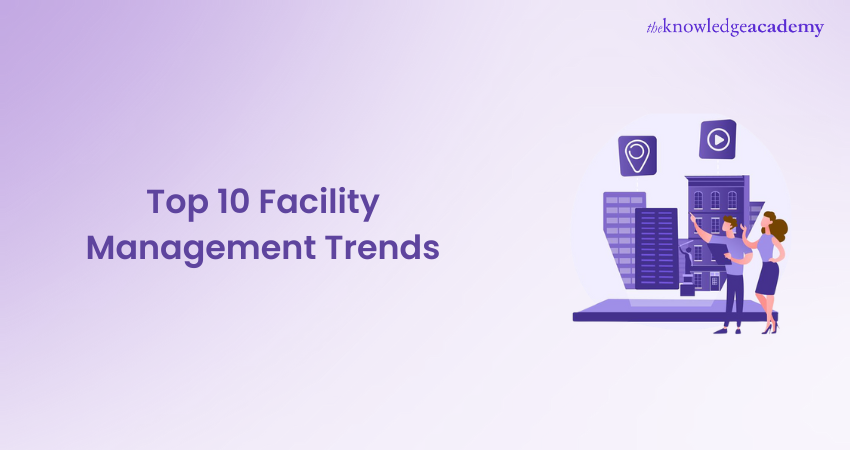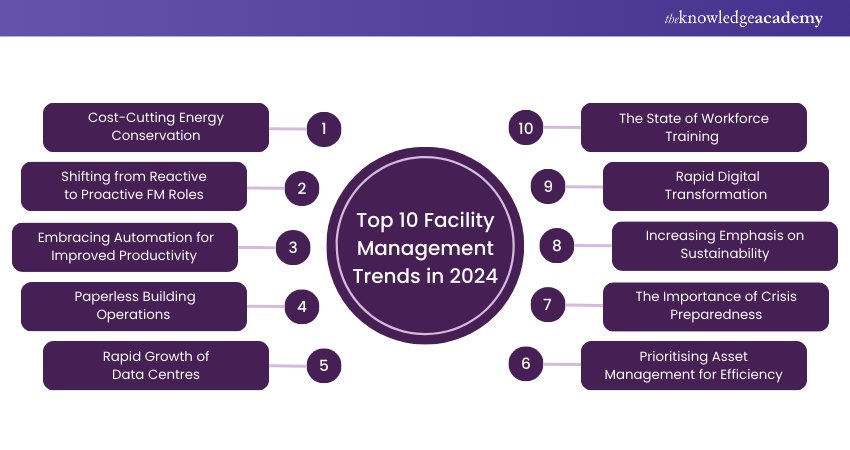We may not have the course you’re looking for. If you enquire or give us a call on +44 1344 203 999 and speak to our training experts, we may still be able to help with your training requirements.
Training Outcomes Within Your Budget!
We ensure quality, budget-alignment, and timely delivery by our expert instructors.

Imagine walking into a workplace where every detail is in harmony, systems hum seamlessly, and the atmosphere is charged with creativity and energy. Facility management has risen above cleanliness and order; it's now becoming a designing environment that sparks innovation and elevates productivity. As the industry advances, staying ahead of these trends is valuable for maintaining a competitive edge. Let’s continue our journey into this blog to discover the top 10 facility management trends transforming how you manage your spaces.
Table of Contents
1) Top 10 Facilities Management Trends
a) Cost-cutting Energy Conservation
b) Shifting from Reactive to Proactive FM Roles
c) Embracing Automation for Improved Productivity
d) Paperless Building Operations
e) Rapid Growth of Data Centres
f) The State of Workforce Training
g) Rapid Digital Transformation
h) Increasing Emphasis on Sustainability
i) The Importance of Crisis Preparedness
j) Prioritising Asset Management for Efficiency
2) Conclusion
Top 10 Facilities Management Trends
As we look ahead to the future of facility management, it's clear that innovation and adaptability will be key drivers of success. Here are the ten facilities trends that will continue to reshape this vast industry.

1) Cost-cutting Energy Conservation
Energy conservation has become a cornerstone of facilities management due to rising operational costs and environmental concerns. Managers are increasingly adopting energy-efficient technologies, such as LED lighting, HVAC optimisation, and smart energy management systems. These initiatives reduce energy consumption and contribute to significant cost savings over time.
A growing trend that is in line with larger sustainability objectives is the integration of renewable energy sources, including solar and wind turbines. By focusing on energy conservation, facilities management is evolving to balance financial objectives and environmental responsibilities.
2) Shifting from Reactive to Proactive FM Roles
Facilities management (FM) is transitioning from a reactive approach—addressing issues as they arise—to a proactive one, where potential problems are anticipated and prevented. This shift is being driven by the adoption of predictive maintenance technologies and data analytics, which allow facility managers to identify and address equipment failures before they happen.
By embracing a proactive mindset, FM roles are becoming more strategic, focusing on long-term asset performance, risk management, and operational efficiency. This trend enhances the reliability of facilities and reduces unexpected downtime, leading to more efficient and cost-effective operations.
3) Embracing Automation for Improved Productivity
Automation revolutionises facilities management by enhancing productivity and reducing manual intervention in routine tasks. Automation technologies improve accuracy and streamline operations, ranging from high-tech lighting and climate control systems to predictive maintenance and asset tracking. Facilities managers leverage these technologies to optimise resource allocation, reduce operational costs, and enhance service delivery.
The synthesis of Internet of Things (IoT) devices and Artificial Intelligence (AI) advances this trend, enabling real-time monitoring and decision-making. As a result, facilities management is becoming more efficient, responsive, and capable of meeting modern building operations' demands.
4) Paperless Building Operations
The push towards paperless operations in facilities management reflects the broader digital transformation trend. By adopting digital tools and platforms, facilities managers can manage work orders, inspections, and maintenance schedules more efficiently, reducing the reliance on paper-based processes. This change not only improves data accuracy and accessibility but also helps to preserve the environment by reducing paper waste.
Digital documentation and cloud-based systems enable seamless communication and collaboration among teams, ensuring that critical information is easily accessible. As a result, paperless building operations are becoming a standard practice in modern facilities management.
Harness the power of Supply Chain Strategy with Supply Chain Management Training - sign up now!
5) Rapid Growth of Data Centres
The rapid expansion of data centres is a major trend in facilities management, driven by rising cloud computing, big data, and digital services demands. Data centres require specialised management to ensure optimal performance, energy efficiency, and security. Facilities managers in this sector focus on maintaining critical infrastructure, such as cooling systems, power supply, and cybersecurity measures.
The growth of data centres also emphasises the need for sustainable practices, as these facilities consume significant amounts of energy. As data centres continue to increase, facilities management in this area is evolving to meet the unique challenges of this high-tech environment.
6) The State of Workforce Training
Given the rapid advancements in technology and shifting industry standards, workforce training is an essential component of modern facility management. Facilities managers are increasingly investing in training programs to equip their teams with the necessary skills to operate new technologies, adhere to safety regulations, and implement best practices.
The focus is on continuous learning, with training modules covering areas such as automation, energy management, and sustainability. By prioritising workforce development, facilities management ensures that its personnel can maintain high-performance levels, efficiency, and compliance in an ever-evolving industry.
7) Rapid Digital Transformation
Digital transformation is reshaping facility management trends by integrating advanced technologies into everyday operations. From building information modelling (BIM) to IoT and AI-driven analytics, these digital tools enhance facilities management processes' efficiency, accuracy, and responsiveness.
Digital transformation enables real-time monitoring, predictive maintenance, and data-driven decision-making, which improves overall operational performance. Facilities managers are adopting these technologies to streamline workflows, reduce costs, and enhance the user experience within buildings. As digital transformation accelerates, it becomes critical to modern facilities management strategies.
Craft your logistics future with Logistics Management Training - register now!
8) Increasing Emphasis on Sustainability
Sustainability is becoming a central focus in facilities management as organisations strive to reduce their environmental impact and meet regulatory requirements. To reduce the carbon footprint of buildings, facilities managers use sustainable practices such as energy efficiency, waste reduction, and water conservation.
Also, sustainable materials and renewable energy sources are gaining popularity. By prioritising sustainability, facilities management not only aligns with global environmental goals but also enhances organisations' reputation and social responsibility. This trend is driving a more environmentally conscious approach to building operations.
9) The Importance of Crisis Preparedness
Crisis preparedness is becoming a higher priority in facilities management as organisations recognise the importance of mitigating the risks associated with natural disasters, pandemics, and other emergencies. Facilities managers are developing comprehensive crisis management plans, including evacuation procedures, emergency communication systems, and contingency plans for critical operations.
Regular drills and training sessions are held to ensure that employees are well-prepared to respond effectively in the event of a crisis. By prioritising crisis preparedness, facilities management ensures the safety and continuity of operations, minimising the impact of unforeseen events.
10) Prioritising Asset Management for Efficiency
Asset management is becoming increasingly important in facilities management as organisations seek to optimise the performance and longevity of their physical assets. Facilities managers implement asset management strategies, including regular maintenance, lifecycle analysis, and data-driven decision-making, to ensure that assets operate efficiently and cost-effectively.
By prioritising asset management, facilities management can reduce operational costs, prevent equipment failures, and extend the lifespan of critical infrastructure. This trend demonstrates a shift towards a more strategic approach to managing physical assets, with a focus on maximising value and efficiency.
Register now to become an AI-driven leader with Certified Artificial Intelligence for Managers Training!
Conclusion
We hope you found this blog “10 facility management trends” insightful and relevant to your career goals. As facility management evolves, these trends such as automation, sustainability, and proactive asset management will continue to empower this industry by maintaining a competitive edge in the modern workplace.
Ignite results with Remote Leadership through the Managing Remote Teams Course- sign up now!
Frequently Asked Questions

Facility management can be improved by adopting best practices such as regular maintenance schedules, data-driven decision-making, leveraging automation tools, ensuring proactive communication, and focusing on sustainability. These strategies enhance efficiency, reduce costs, and ensure optimal asset performance.

The most important concern for facility managers is to ensure health and safety. This priority applies to maintaining clean, secure, and compliant environments to protect occupants and staff, minimise risks, and fulfil regulatory standards. This approach reflects a commitment to overall well-being and operational efficiency.

The Knowledge Academy takes global learning to new heights, offering over 30,000 online courses across 490+ locations in 220 countries. This expansive reach ensures accessibility and convenience for learners worldwide.
Alongside our diverse Online Course Catalogue, encompassing 17 major categories, we go the extra mile by providing a plethora of free educational Online Resources like News updates, Blogs, videos, webinars, and interview questions. Tailoring learning experiences further, professionals can maximise value with customisable Course Bundles of TKA.

The Knowledge Academy’s Knowledge Pass, a prepaid voucher, adds another layer of flexibility, allowing course bookings over a 12-month period. Join us on a journey where education knows no bounds.

The Knowledge Academy offers various Professional Development Courses, including the Facilities Management Training and the Product Management Training. These courses cater to different skill levels, providing comprehensive insights into Top 15 Product Management Tools.
Our Business Skills Blogs cover a range of topics related to management and leadership, offering valuable resources, best practices, and industry insights. Whether you are a beginner or looking to advance your business acumen skills, The Knowledge Academy's diverse courses and informative blogs have got you covered.
Upcoming Business Skills Resources Batches & Dates
Date
 Facilities Management Training
Facilities Management Training
Fri 24th Jan 2025
Fri 28th Feb 2025
Fri 30th May 2025
Fri 15th Aug 2025
Fri 26th Sep 2025
Fri 31st Oct 2025







 Top Rated Course
Top Rated Course



 If you wish to make any changes to your course, please
If you wish to make any changes to your course, please


